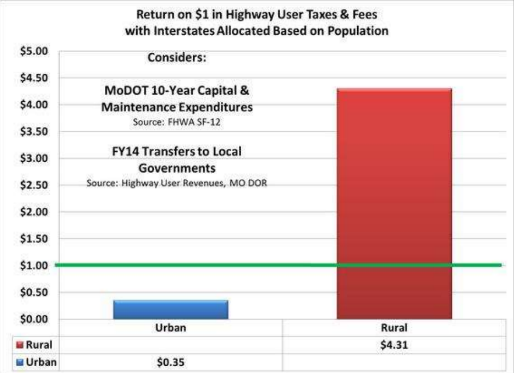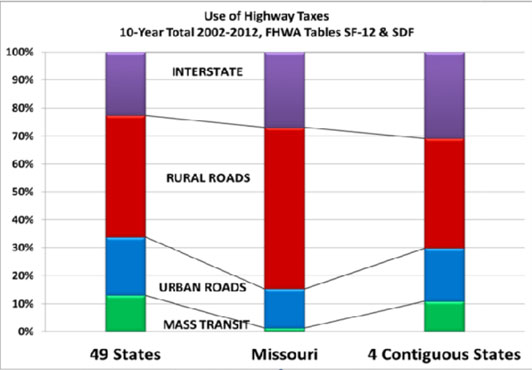
Missouri, like many other states, shifts transportation funds from cities to rural areas -- it collects most gas tax revenue from urban areas and spends it on roads in the hinterlands. And as in many other states, this amounts to a massive transfer of resources from the places where most people of color live.
But in Missouri, the scale of the problem is especially large, local advocates argue in a new report. Now they are challenging the state's transportation policies on civil rights grounds -- a campaign that could set a national precedent if successful.
In their report addressed to the U.S. DOT Department of Justice [PDF], the Missouri Coalition for Better Transportation argues that Missouri DOT violates federal civil rights laws prohibiting agencies that receive federal funds from creating a "disparate impact" on disadvantaged groups. The local NAACP is asking Congressman William Lacy Clay to file a civil rights complaint against the agency.
Here is an overview of the coalition's case against Missouri DOT.
Restrictions on transit spending harm urban residents
Missouri is one of 23 states that forbids gas tax revenues from being spent on transit. The effect of this policy is fundamentally discriminatory against urban residents.
The constitutional ban is a relic of the 1950s, based on an outdated "farm-to-market" model of transportation needs when the state was far more rural, the authors note. Without access to gas tax revenue, local transit agencies struggle to provide service. As a result, the coalition says, transit ridership in Kansas City and Springfield ranks near the bottom among peer cities.
The coalition notes that the disparate impact manifests in alarming ways, like high infant mortality rates in black neighborhoods of Kansas City and St. Louis, where the lack of transit impedes access to medical care.
Massive transfer of resources from urban areas to rural areas
Excluding interstates, urban areas receive only 20 percent of state transportation funding, despite contributing 84 percent of revenues, according to the coalition.

Cities have to pay for their own roads, rural areas do not
MoDOT maintains almost every lightly traveled rural road between Illinois and Kansas. That adds up to 33,892 miles, making Missouri's state road system the seventh largest in the nation, despite being the 18th largest state in terms of population and land area. A road system in proportion to other states would be nearly one-third the size.
Missouri cities, meanwhile, have to cover the cost of road upkeep themselves. MoDOT shirks responsibility for urban roads, maintaining only 19 percent of urban collector roads.
The same pattern applies to bridge maintenance. Over the last few years, the coalition says, Missouri spent 68 percent of its bridge repair money on rural crossings that carry only 17 percent of total bridge traffic, passing over urban bridges despite their bigger maintenance backlog.





